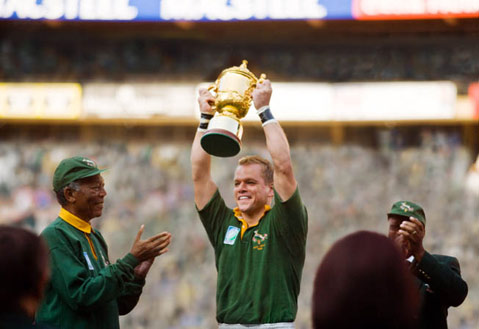Invictus
Morgan Freeman and Matt Damon Star in a Film Written by Anthony Peckham, Based on the Book by John Carlin, and Directed by Clint Eastwood

With the quietly powerful Invictus, Clint Eastwood continues his remarkable directorial run in this late inning of his career. By this point, we have stopped waiting for a lemon, accepting that Eastwood, now pushing 80, has pulled off an almost unprecedented string of reliably fascinating and unpretentiously artful films. With this modest wonder, Eastwood effectively brings the majesty of Nelson Mandela to the screen, by proposing a subtle and specific saga-President Mandela’s efforts to consolidate national spirits by guiding the rugby team to victory in the 1995 World Cup-while calmly but surely alluding to the greater grandeur of Mandela’s life and peaceable legacy.
Comparing this year’s Eastwood model to last year’s, Gran Torino, both films deal with racial coming-to-terms, but this time in a peaceful and controlled setting, where the violence is restrained to the playing field. In another way, Invictus continues a line of reasoning and two-sided questioning that began in Eastwood’s twofer experiment a few years ago, in which Flags of Our Fathers and Letters from Iwo Jima imagined the Iwo Jima experience from both American and Japanese perspectives.
Fundamentally, Invictus is a treatise on delicate post-apartheid politics, poetry, and a peace-seeking mission, but is disguised in the garb of a sports film-replete with the usual slow-motion climactic game to cap it off. In sports-film mode, this is the second powerful and creative entry in sports-minded cinema released this year, along with The Damned United. But there is much more at issue, starting with the title itself, referring to a Victorian poem that Mandela used to console and inspire himself during his nearly 30 years in prison.
Morgan Freeman, one of our indisputably great living film actors, rarely ceases to amaze, but he reaches a new height of expression here, as the handpicked thespian to play Mandela. But the performance is bravura lined with commanding understatement, as befits the master peacemaker. “The rainbow nation starts here,” he tells a group, announcing his intention to embrace the sport of the former apartheid regime rather than abandon it. “Reconciliation starts here.” That notion is at the heart of this story, which manages to be genuinely inspirational without the sentimental aftertaste.



